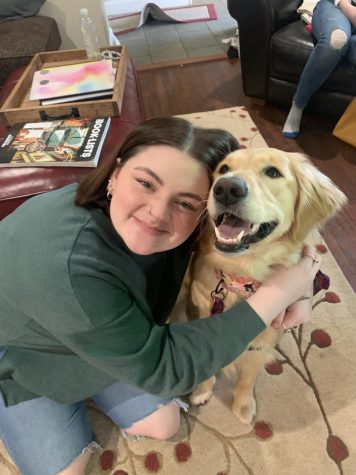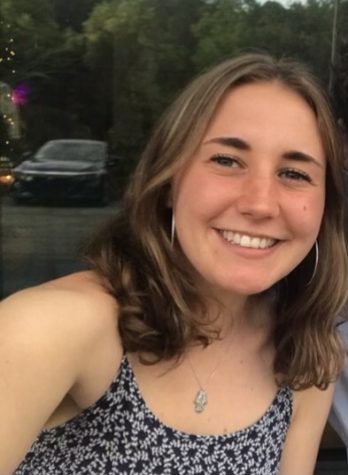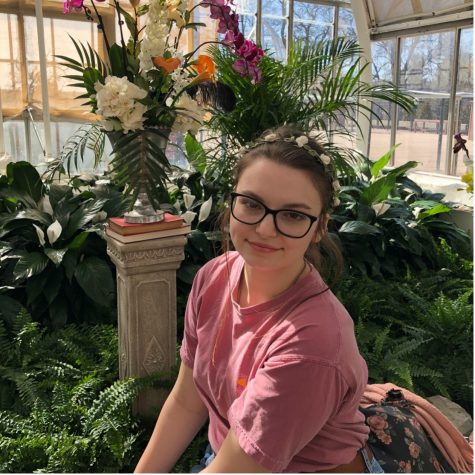Going to school with COVID-19: One year later and what Chatham can improve
In Fall 2020, Phebe Kimble ’24 got COVID ahead of Thanksgiving Break. University policy has since changed, but Kimble’s experience was confusing and frustrating.
October 29, 2021
This is Part 3 of a 3-part series on Kimble’s COVID-19 experience. Part one describes Kimble’s experience getting tested on campus and how Chatham’s current policy differs. It can be read here. Part two details Kimble’s experience in quarantine and going to class post-COVID. It can be read here.
COVID-related health problems still impact Kimble today
Phebe Kimble’s ‘24 COVID-experience still affects her mentally. “I am so scared to be around people, especially like bigger groups and being back on campus…it just makes me nervous.”
Her symptoms were flu-like and mild at first, but they eventually developed into severe migraines, body aches and fatigue — symptoms that are still present today, almost a full-year later.
“If I have a migraine or a headache, Tylenol, Advil, things like that will help, but I haven’t found anything that has suppressed the symptoms as a whole,” she said.
“The body aches and migraines…they don’t happen as often, but I still get them weekly,” Kimble said. She still constantly experiences fatigue, struggles with her memory and has trouble focusing.
“Some days, I feel like I physically cannot get up because I am so tired,” she said. “Or I can’t do my work because I don’t remember half of the things that I hear in class. Or I can’t focus on an assignment long enough to be able to finish it. It’s very aggravating.”
She wants Chatham to offer more virtual classes to students that want them, rather than having a large majority of the classes in-person.
Shawn McQuillan-Krepps, assistant Dean of Students, said that Chatham is not anticipating going virtual this year, but that plan can always change depending on public health guidance.
McQuillan-Krepps also said that, if the stress of the past year has made in-person learning challenging for students, they should reach out to their academic advisor. Chatham does still offer some virtual classes, but not to the scale that they have been offered for the past few semesters.
Students can also utilize the University’s counseling services if they feel stressed. They can make an appointment by calling (412) 365-1282 or emailing [email protected].
“A student can also decide to take a semester off,” McQuillan-Krepps said. “It’s always best to take care of yourself, your health, your wellbeing, first and foremost.”

Annette Muller, Chatham’s nurse practitioner, advises that any student experiencing long-term COVID symptoms is to see their family doctor or contact her. Muller can refer students to someone locally.
Kimble has not yet gone through the Office of Academic & Accessibility Resources (OAAR) at Chatham to get accommodations for her symptoms.
To get medical accommodation, students need some form of medical documentation, according to McQuillan-Krepps.
“Getting an accommodation would be very, very helpful,” Kimble said, “I just don’t know how I am going to go about that…I don’t know how [diagnosing my symptoms] all works, it’s all so new.”
Kimble is currently trying to schedule appointments and get proper documentation for her symptoms.
Muller was also unsure about the logistics of obtaining a medical diagnosis for COVID long-haulers because she is no longer in primary care. For that reason, she again asks that students contact their primary care physician.
What the future holds for Kimble, and what students post-COVID think Chatham can improve
Kimble went to see a pulmonary specialist at the Allegheny Health Network’s COVID-clinic in the North Shore in early October in the hopes of improving and understanding her symptoms. She was recommended this option from other doctors due to her constant shortness-of-breath.
At the appointment, Kimble underwent a chest x-ray because the physicians were concerned about her heart and lungs. The doctor told Kimble that her symptoms were very unfortunately common and that he didn’t know when Kimble would be back to her normal self, if ever.
“I don’t want to be here,” Kimble said. “I wish I could just be safe [at home], but I can’t… I understand that that is more work for professors, but, I mean, we’ve done it before. We know how to do it.”
Kimble wants Chatham, on top of offering more virtual classes, to also listen to the experience and struggles of students who have had COVID-19 in the past.
She was under the impression that vaccines would be mandatory ahead of this fall semester, with less exemptions granted.
The campus sits at 92% vaccinated. Some students have opted for vaccine exemptions with medical, religious, or other reasons.
“Nationally, we are hearing a lot about [breakthrough cases], and they are going to happen. But, what we are not hearing about are the [instances] where there was no breakthrough because the vaccine worked,” McQuillan-Krepps said.
Kimble thinks Chatham should require vaccinations now that the Pfizer-BioTech vaccine is FDA-approved. “The vaccine is the only way that we know can keep people safe and, not to be morbid, but it’s keeping people alive,” Kimble said.
“If Chatham really wants to see the old college life be back,” she continued, “they need to have everyone be vaccinated.”
“This summer it felt like things were almost normal,” Esmée DeCortie ’22 said. She contracted COVID-19 around the same time as Kimble, but she has no lasting side effects. “It still kind of does because there is such a high vaccination rate on campus.

“I am worried less semester than I was last year,” she continued, “but you can definitely tell that people are getting looser with social distancing and masks and probably washing hands too…there have been colds going around, and that hasn’t happened for like a year and a half.”
DeCortie was hesitant to fully support a campus-wide vaccine mandate. “The most important thing is to get vaccinated but making it mandatory…I don’t know [how people would feel] about taking away their choices.”
DeCortie suggested that Chatham should have more information advertised and accessible to students regarding the vaccine. She believes that this might persuade some people to get vaccinated.
“I think it would be most effective coming from professors,” DeCortie said, “because almost everybody on campus has a professor that they have a connection with, or that they respect.”
“Even though I had COVID and I am vaccinated,”Kimble said, “I could still get it again, and that’s my biggest fear.”
Kimble is considering transferring to another university, partially due to how her COVID-experience was handled last fall.







